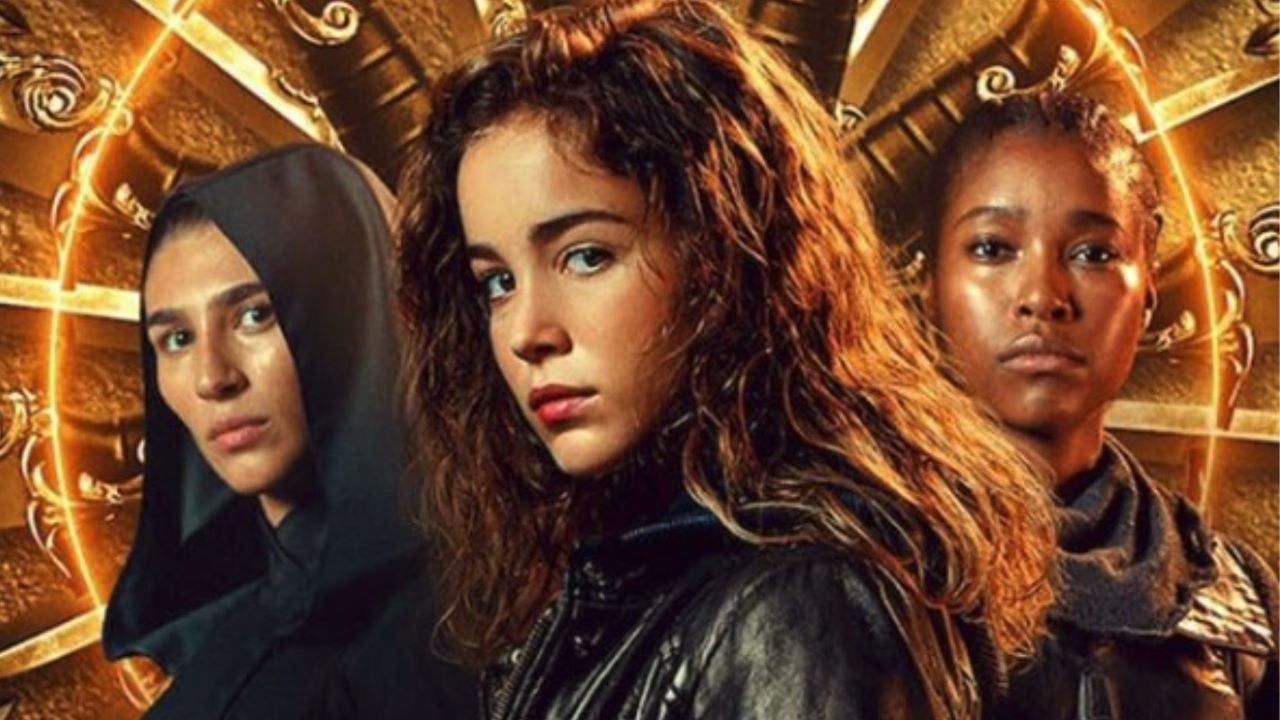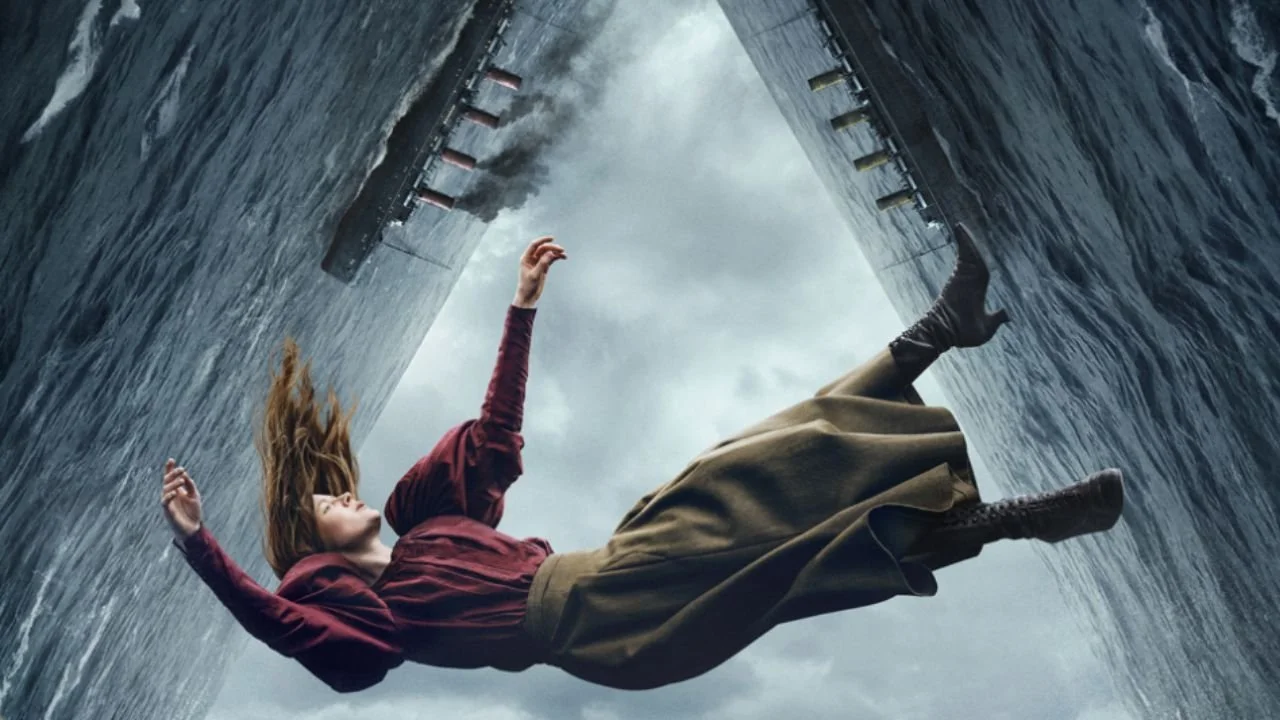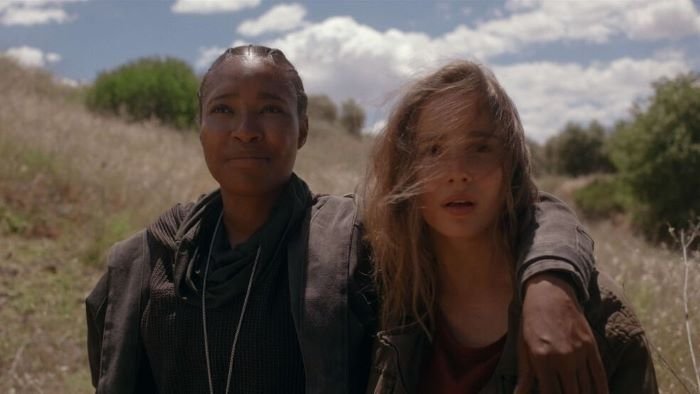Reasons Why We Need ‘Warrior Nun’ Season 3
From left to right: Sister Lilith (Lorena Andrea), Ava Silva (Alba Baptista), Shotgun Mary (Toya Turner)
Image Source: Movieguide
It is not a good feeling when your favorite show gets canceled. Unfortunately, it is a feeling many people are accustomed to these days. 2022 saw a wide swathe of shows across different networks and genres canceled, but one particular cancelation has turned Twitter upside down—Netflix’s Warrior Nun.
The series follows Ava, a 19-year-old woman who wakes up in a church morgue with a mystical artifact known as “the Halo” embedded in her back. Soon, Ava is recruited by a sect of nuns known as the Order of the Cruciform Sword (OCS), where she learns to use her new powers as divine forces fight to take over the world. The show debuted on Netflix in 2020 and was later renewed, with its second season airing in late 2022. But despite praise from critics and audiences alike, Warrior Nun was canceled in mid-December 2022.
RELATED:
The response was not positive. Within hours of the news, the Warrior Nun fandom, dubbed “The Halo-Bearers,” took to social media to voice their ire. The hashtag #SaveWarriorNun catapulted to the top trending lists, reaching over 7 million tweets and growing. Newsletters and interviews with the Warrior Nun cast and crew were published. Fans even put up a billboard across the street from Netflix Headquarters.
While some might dismiss this as fandom overreacting, the Warrior Nun fans have a point. Warrior Nun isn’t just “sexy nuns with guns” (as the lead actress, Alba Baptista put it), but an exciting blend of fantasy, religion, real-world commentary, and occult mystery, with deep themes and incredible characters.
These are the reasons why Warrior Nun deserves to be saved.
It Has An Incredible, Well-Utilized Cast of Characters
Warrior Nun marks the first time that Alba Baptista (Ava, above) has performed in an English-speaking role in her career.
Image Source: Fandomentals
Any writer knows that a great cast trumps a great plot. This is something the Warrior Nun writers clearly took to heart. Everyone serves a role that propels the story and subplots forward with their own moments in the spotlight and impeccable chemistry, whether they be playing enemies, friends, or lovers.
Whether it be Ava’s journey of self-discovery, Beatrice overcoming old emotional scars, Lilith wrestling with her loyalty to the OCS and the demands of family, or Father Vincent struggling with his inner darkness, each character feels multidimensional and alive without disrupting the rhythm of the plot. This is sadly uncommon with similar shows, such as Stranger Things, Legacies, and Titans, where some characters (or even protagonists) go whole seasons without any kind of characterization or individual arcs.
Warrior Nun proves that you can have a Netflix show where the characters outshine the story and still have the show work. If you did not fall in love with or relate to at least one character, you might be dead inside.
It Improves Old Tropes And Subverts Others
Mary and Ava’s friendship was a highlight of Season 1, helping to build both characters and flesh out the world around them.
Image Source: Warrior Nun Wiki
At some point, a story is guaranteed to have some kind of trope in it. While some tropes have become a little too fixed, predictable, or downright harmful, some shows have found ways to improve or subvert them. Several Warrior Nun characters are trope-defiant in their own way, but the two that come to mind mainly are Sister Camila and Shotgun Mary.
Sister Camila is the “cinnamon roll” of the OCS. While this small and soft-spoken nun might prefer prayer, cleaning, and playing “Pink + White” on the piano, she has a dangerous side too. From firing a machine gun at a group of rogue nuns to hacking alarms and cars, the audience learns that this “cinnamon roll” can actually kill you. This balance of gentleness and tenacity not only makes Camila a three-dimensional character but also defies the “Passive Cinnamon Roll” trope when the sweet and gentle characters barely have any moments of action. Camila reminds you never to judge a book by its cover - especially a nun.
On the opposite end of the spectrum, then Shotgun Mary is the embodiment of “looks like they can kill you and can kill you.” The OCS' wild card, Mary's loyalty, fighting prowess, and dual shotguns made her a breakout and a fan-favorite character of the show. She also defies the “Angry Black Woman” trope, depicted as a woman of color who is strong and taken seriously not because of a short temper but because of her determination, drive, and willingness to shoulder burdens that others in the OCS would not.
Tropes are inevitable, yes, but that does not mean that one cannot put their own spin on them. Warrior Nun demonstrates that subverting such tropes is not only innovative but also a breath of fresh air when it does not indulge in stereotypes. Everybody wins!
It Has Record-Breaking Scores And Numbers
The most widely assumed reason for a show’s cancellation is a lack of viewership or poor critical ratings, but neither seemed a problem for Warrior Nun. At the time of writing, Rotten Tomatoes rates Warrior Nun season two with a 100% critic rating and a 99% audience rating from almost 9000 people, making it the best-scored season of a show in Netflix’s history. The show also made it onto the Netflix Top 10 List worldwide and the “must-watch” lists of The New York Times and Washington Post. Warrior Nun was able to achieve all of this while competing with the simultaneous releases of Wednesday, new seasons of Manifest, The Crown, and a promotional budget of literally $0. This rules out the “poor viewership” and “poor critical reception” argument.
For some, these record-breaking scores and praise made the cancelation hurt even more. A recent interview with Netflix’s co-CEOs, Ted Sarandos and Greg Peters, certainly did not help matters, in which the former stated that “(Netflix) has never canceled a successful show. A lot of these shows were well-intended but talk to a very small audience on a very big budget.”
Labelling Warrior Nun as a “very big budget” show is a stretch when one considers that the show doesn’t even crack the list of Netflix's most expensive shows, which ranges from Stranger Things at #1 ($30 million per episode) to Orange Is The New Black at #10 ($4 million per episode). In addition, Warrior Nun was shot in Spain, which has introduced major tax incentives for foreign media filmed on location.
Even more baffling was Greg Peters's plan to replicate the success of a show like Squid Game on a weekly basis, which earned a $900M profit during its run. Forbes magazine described this plan as “coming across so poorly and so tone deaf to genuine, major issues Netflix faces.” It’s also worth noting that much of Squid Game’s marketing came from word of mouth and fortunate timing, which could be challenging for other shows to replicate.
It is clear that if Netflix wants to see any change in its shows, it may first have to make changes regarding its data transparency and approach to new shows. Will such changes be enough, or is it too little too late?
It Depicts Themes Often Underdiscussed In The Genre (And The World)
The angel Adriel (William Miller) founded the OCS with the help of Areala, the first Warrior Nun.
Image Source: HITC
One can tell by Warrior Nun’s title and cast that it will focus on religion, feminism, and good versus evil. But few have caught onto other topics that the show addresses like false prophets, science versus religion, and free will.
The show explored the key biblical theme of “false prophets,” those who claim to preach God's will but actually wish to lead mankind astray. This is seen in the history of the OCS, its founders, Areala and the angel Adriel, and the Catholic Church itself. To put it succinctly, there are false prophets aplenty throughout the world of Warrior Nun, some more ravenous than others.
The themes of science and religion are played out in Season 1 through the characters Jillian Salvius and Cardinal Duretti as they vie over the former’s latest invention, a transdimensional portal called “The Arc.” As a scientist, Jillian sees the potential that the Arc has for humanity, as the portal supposedly leads to a world without sickness and death. Duretti, on the other hand, is concerned that the Arc is humanity overstepping and tempting God’s wrath. Neither character is presented to be wholly right or wrong, with the Warrior Nun writers trusting the audience enough to make their own decisions. As the show asks, is it that faith and science can't meet or that those on either side won't?
The question of free will is an overwhelming yet omnipresent theme in Judeo-Christianity. If God has a plan for everyone, then do the choices humans make in their lives even matter? How much is a choice, and how much is pre-determined? This question is played out through Ava’s journey in Season 1, but to describe it in detail would be a disservice to Alba Baptista’s excellent and heart-wrenching performance. In the words of Jean de La Fontaine, “a person often meets his destiny on the road he took to avoid it,” a fact that Warrior Nun reminds its audience of every step of the way.
It Exemplifies Diversity And Representation
SpoilerTV praised “Avatrice” as a “beautifully delivered love story” with “unparalleled onscreen chemistry”.
Image Source: SpoilerTV
A lot of shows and films are taking steps to be more diverse, both with their stories and the characters used to convey them. While the results have been mixed in terms of praise versus backlash, the issue of diversity is nonetheless an important matter for many audiences.
The Warrior Nun cast boasts several members of diverse backgrounds and ethnicities. Beatrice is played by Kristina Tonteri-Young, an actress with a mixed Caucasian/Asian heritage. Mary is played by Jamaican actress Toya Turner, and Lilith is played by Lorena Andrea, a Spanish/Columbian actress. The characters of Mary, Sister Shannon, Ava, and Beatrice are LGBTQ+ as well, with the latter two forming the ship dubbed “Avatrice.” “Avatrice” has also won over critics with sites like Collider and Den of Geek citing it as "how to do a slow-burn, queer romance right."
However, this sadly makes Warrior Nun another headstone in the graveyard of canceled Women Loving Women (WLW) shows, causing many to wonder whether or not Netflix is apathetic to or setting up their WLW shows to fail. Netflix still won't elaborate on the reasons for nor the methods by which they decide renewal or cancelations. Shows like First Kill, Everything Sucks, I Am Not Okay With This, and Teenage Bounty Hunters were left to compete against bigger properties like Stranger Things, Squid Game, and The Crown with diminished promotion, lower budgets, and being ungraciously dropped when they can, which hardly seems fair. The data on views, ratings, and budgets are publicly available, so one can form their own objective opinion on the matter, but it is important not to be dismissive of these concerns.
The movement to save Warrior Nun has been going on for over a month and shows no sign of slowing down. If readers would like to join in the fight, they can find a list of resources at savewarriornun.net or check out the #SaveWarriorNun hashtag on Twitter.
We wish the Halo-Bearers all the best in their efforts for renewal.
READ NEXT:
Source(s): Twitter, Rotten Tomatoes, CBR, Bloomberg, Netflix Life, Forbes [1], [2], Collider

















